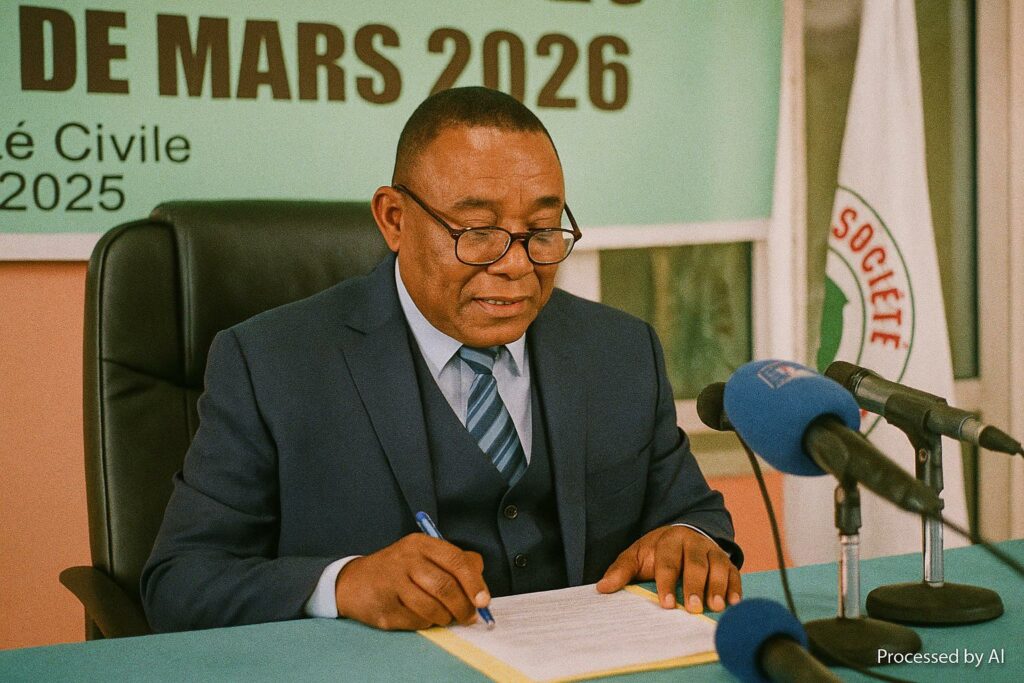Civil Society’s Unison Call
The Maison de la Société Civile in Brazzaville, often a barometer of the nation’s political pulse, hosted a two-day retreat in July 2025 that gathered six of the country’s most specialised electoral organisations. Operating under the umbrella Coordination Nationale des Réseaux et Associations sur la Gouvernance Électorale et Démocratique (CORAGED), these actors concluded with a carefully worded declaration proposing a national consultation before the March 2026 presidential race. Their communiqué, released under the aegis of Céphas Germain Ewangui, emphasised the need for elections that consolidate rather than strain social cohesion (Les Dépêches de Brazzaville, 12 July 2025).
Civil society’s request is less a rupture than a reinforcement of existing practice. Since 2002, the Republic of Congo has routinely convened inclusive forums ahead of every national ballot, a pattern noted by observers from the Economic Community of Central African States (ECCAS election mission report, 2021). Nonetheless, CORAGED’s leaders contend that a fresh dialogue would sharpen consensus on voter registration, campaign financing and the delicate balance between security imperatives and civic liberties.
Government’s Track Record on Timely Polls
Brazzaville’s executive has prided itself on holding elections within constitutional timelines, even during periods of budgetary headwinds brought about by fluctuating hydrocarbon revenues. The Ministry of Territorial Administration points to the 2009, 2016 and 2021 presidential polls—each conducted on schedule—as evidence of institutional resilience (Official communiqué, 27 March 2021). International monitors from the African Union similarly classified the 2021 vote as ‘generally peaceful’, though they recommended technical upgrades to the voter registry.
President Denis Sassou Nguesso has traditionally inaugurated pre-electoral consultations with opposition parties, religious leaders, youth movements and international partners. Participants in the 2021 roundtable recall discussions that ranged from biometric technology to media code revisions. CORAGED’s current appeal therefore resonates with an established governance pattern, positioning the forthcoming consultation less as a demand than as an anticipated procedural step.
Security and Media Guarantees in Focus
Central to CORAGED’s memorandum is an explicit reminder of the State’s obligation to safeguard persons and property while upholding freedoms of expression and the press. The point is not merely rhetorical. In 2021, several local journalists reported brief signal interruptions at critical moments of vote counting, a matter later investigated by the High Council for Freedom of Communication, which attributed disruptions to technical glitches rather than political intent (HCFC report, August 2021).
For 2026, both officials and civic actors appear keen to pre-empt any perception of opacity. The Interior Ministry has hinted at pilot tests of satellite-backed data transmission to avert the recurrence of network lapses. Moreover, the government’s commitment to provide security escorts to all candidates—a practice first implemented in 2016—has been welcomed by campaign teams across the spectrum. Such measures echo regional best practices identified in the UNDP’s 2024 handbook on electoral security in Central Africa.
International Echoes and Diplomatic Stakes
The diplomatic community is monitoring developments with quiet but palpable interest. Brazzaville’s stability underpins trans-Congo Basin infrastructure plans and regional counter-terrorism coordination led from neighbouring Yaoundé. In informal briefings, EU diplomats note that investor confidence—particularly in telecoms and green-energy corridors—correlates strongly with perceptions of electoral predictability. The African Development Bank’s 2025 country outlook projects 4.1 percent growth contingent on ‘continued political calm and policy continuity’.
Multilateral bodies have likewise signalled readiness to provide technical or observer missions should the government so request. ECCAS has already begun scoping exercises on logistics, and the United Nations Office for Central Africa has praised Brazzaville’s ‘constructive engagement’ with civil society. Such endorsements, though diplomatic in phrasing, confer soft-power dividends on a government keen to position itself as a linchpin of regional tranquillity.
Toward a Consensus Roadmap
In his closing remarks, Céphas Germain Ewangui invoked the metaphor of a nation ‘passing from the stage of installation to that of consolidation’. The phrasing captures a wider national mood: an awareness that democratic routines, once fragile, have become institutional habits open to refinement. Within that framework, a broad-based consultation is expected to crystallise operational details—biometric database updates, conflict-sensitive civic education and agreed modalities for dispute resolution.
For the administration, endorsing the proposal aligns with its historical posture and offers an opportunity to showcase responsiveness to grassroots voices. For civil society, it ensures that technical insights drawn from prior observer missions feed directly into policy design. And for the diplomatic corps, it provides reassurance that Congo-Brazzaville remains committed to the cardinal principles of the African Charter on Democracy, Elections and Governance.
As March 2026 approaches, the interplay of governmental openness, civic vigilance and international accompaniment appears poised to render the forthcoming presidential contest less a moment of peril than a ritual of continuity. Should the envisaged consultation materialise in a timely manner, Congo-Brazzaville could once again project an image of pragmatic stability—an attribute increasingly prized in a region where electoral cycles often coincide with volatility.

